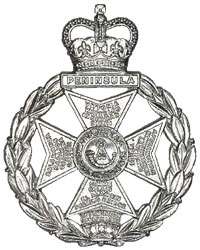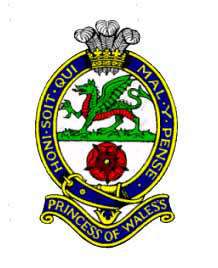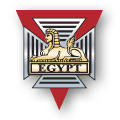Royal Rifle Volunteers
| The Royal Rifle Volunteers | |
|---|---|
| Active | 1999 – 2007 |
| Allegiance |
|
| Branch |
|
| Type | Line Infantry & Light Infantry |
| Role | Light Role Infantry — Army Reserve |
| Size | 1 Battalion |
| Part of | 145 (South) Brigade (United Kingdom) |
| Colours | Green, Yellow, Blue |
| Disbanded | July 2007 |
The Royal Rifle Volunteers is a former regiment of the British Territorial Army. It was, for most of its existence, the TA infantry in the counties of Hampshire, Berkshire, Wiltshire, Oxfordshire, Buckinghamshire and the Isle of Wight.
History

The regiment was formed on 1 July 1999 by the amalgamation of elements of the 6th/7th (Volunteer) Battalion, The Princess of Wales's Royal Regiment, 2nd (Volunteer) Battalion, The Royal Gloucestershire, Berkshire and Wiltshire Regiment and the 5th (Volunteer) Battalion, The Royal Green Jackets due to the reforms of the Territorial Army implemented following the Strategic Defence Review. It was the infantry component of 145 (Home Counties) Brigade.
Its companies during its eight-year existence were:[1]
- HQ Company in Berkshire - 1999-2007
- A (Royal Green Jackets) Company in Oxfordshire - 1999-2007
- B (Royal Gloucestershire, Berkshire and Wiltshire) Company in Berkshire - 1999-2006 (amalgamated into HQ Company, keeping its rifle platoon in Swindon, Wiltshire)
- C (Duke of Connaught's) Company in Hampshire - 1999-2005 (became D Company, 3rd Battalion, Princess of Wales's Royal Regiment, minus its rifle platoon based on the Isle of Wight)
- E (Royal Green Jackets) Company in Buckinghamshire - 1999-2007
- F (Royal Green Jackets) Company in London - 2006-2007
- G (Royal Green Jackets) Company in London - 2006-2007
In 2002 the Royal Rifle Volunteers took part in a major NATO "Partnership for Peace" exercise in the Ukraine codenamed Exercise COSSACK EXPRESS.[2] In 2003 the Royal Rifle Volunteers took part in a major NATO exercise in Lithuania codenamed Exercise AMBER HOPE. A formed platoon was also deployed to Afghanistan as part of Op FINGAL. Some soldiers from E (RGJ) Coy also deployed to Bize, Albania in support of the Royal Welsh Regiment's "Partnership for Peace" exercise codenamed ALBANIAN EXPRESS. In 2005 a formed company (Roebuck company) from the RRV, along with a platoon attachment from the 3rd Battalion Princess of Wales's Royal Regiment was dispatched to Iraq which was part of the Multi-National Division (South East) as part of Op TELIC.
A Mixed Cap Badge Battalion



The RRV consisted of sub-units that all had their own Regimental affiliations. Soldiers of the RRV would work together in this multi-cap badge battalion. This led to a healthy competition between companies, but caused no major issues apart from foot drill. The unit would have to come up with innovative methods of mixing the light drill of RGJ companies and the heavy drill of the PWRR and RGBW companies.
Mobilisations
The regiment's four mobilisations were:
- Platoon(+) - Operation FINGAL
- Platoon to Eden Company - Operation Telic 3
- Company (-) as Roebuck Company - Operation Telic 6
- Platoon (-) as Salamanca Platoon Force Protection - Operation Herrick 4 & 5
Afghanistan 2003
The 2003 Operation FINGAL deployment[3] saw a platoon(+) of RRV personnel join with a platoon(-) from the East of England Regiment. These in turn then formed 4 and 5 platoons of A company the 2nd Batallion of the Royal Anglian Regiment (the poachers). The two platoons were noteworthy due to their performance in pre-deployment training and acceptance onto the A company ORBAT. The platoons worked well throughout their tour as part of the Kabul Patrols Company. Roles and responsibilities included:

- Patrolling of police districts 8 and 9 in the NE and SE of Kabul.
- Quick Reaction Force duties in Kabul.
- Detached duties at Bagram Airbase.
- Force Protection of Camp Souter.
- Reserve and surge operations at behest of COMBRITFOR.
44 soldiers from the RRV were deployed, 2 Officers, 2 SNCOs and 40 JNCOs/ORs. The deployment received much acclaim as it highlighted the interoperability of the regular and reserve forces, with the TA soldiers assuming most of the duties of their regular counterparts.[4]
Iraq 2003/04 - Operation Telic 3
The 2004 Operation TELIC 3 deployment again saw a Platoon of RRV personnel join a platoon (+) of the East of England Regiment. These two platoons plus a number of individual reinforcements from 200 signals squadron and permanent staff formed a company(-) group, later named Eden company. The company took responsibility for the security of Basra palace its immediate AOR, media operations escorts, river patrols on the Shatt Al-Arab waterway and formed a reserve for the brigade.

Reorganisation & later Amalgamation with other units
On 24 November 2005, the MOD announced a reorganisation of the army, and it was planned that the RRV would become 4th Battalion, Royal Green Jackets, and the PWRR company (C) would be reassigned to 3 PWRR as D company and its Isle of Wight platoon rerolled to a Royal Logistics Corps unit.
However, at a later date the Light Division decided to amalgamate the Light Infantry and Royal Green Jackets. The RRV became their 7th Battalion on formation of the new regiment, 1 February 2007.[5] Currently, the RRV is now 7th Battalion the Rifles.[6]
D company 3 PWRR, (formerly C Coy RRV) has now rerolled into No. 679 (The Duke of Connaught's) Squadron Army Air Corps.[7][8]
Further Information
The Royal Rifle Volunteers on Operations by Lt Col Mike Scott PWRR was published shortly after his period as Commanding Officer and provides the definitive published history of the Regiment.
Commanding Officers
The four commanding officers were:
- Lt Col Mike Motum, RGBW - 1999-2001
- Lt Col "Roddy" Windsor, RGJ - 2001-2003
- Lt Col Mike Scott, PWRR - 2003-2006
- Lt Col Damian Griffin, TD, RRV - 2006-2007 (became CO 7th Bn, The Rifles)
References
- ↑ "The Royal Rifle Volunteers - Everything2.com". everything2.com. Retrieved 2015-08-27.
- ↑ "RRV C Coy Ukraine - Royal Green Jackets Association Photographic Site". www.rgjphotos.org.uk. Retrieved 2015-08-27.
- ↑ Administrator, getreading. "TERRITORIALS IN TRAINING FOR AFGHAN DUTY". Retrieved 2015-08-27.
- ↑ WAURior, The (June 2003). "Update from sister units" (PDF). The official newsletter of the Western Australian University Regiment Association Inc. Retrieved August 2015. Check date values in:
|access-date=(help) - ↑ "British Army units from 1945 on - Royal Rifle Volunteers". british-army-units1945on.co.uk. Retrieved 2015-08-27.
- ↑ "7 RIFLES - British Army Website". www.army.mod.uk. Retrieved 2015-08-27.
- ↑ "6 Regt AAC - British Army Website". www.army.mod.uk. Retrieved 2015-08-27.
- ↑ "End of an era as Portsmouth soldiers change from infantry to air corps". www.portsmouth.co.uk. Retrieved 2015-08-27.